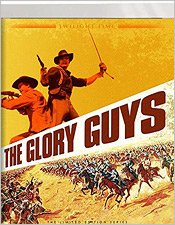Glory Guys, The (Blu-ray Review)

Director
Arnold LavenRelease Date(s)
1965 (August 16, 2016)Studio(s)
United Artists/Levy-Gardner-Laven (Twilight Time)- Film/Program Grade: B+
- Video Grade: A
- Audio Grade: A
- Extras Grade: A
Review
In the 1950s, Sam Peckinpah was making a name for himself as a hotshot TV writer on shows like Gunsmoke and The Rifleman when producers Arnold Laven, Arthur Gardner, and Jules Levy hired him to adapt Hoffman Birney’s novel The Dice of God, a fictional gloss on the story of George Armstrong Custer. By the time Peckinpah’s script was actually filmed under the title The Glory Guys and released in 1965, Peckinpah’s career had already gone through a number of ups and downs, including the artistic (if not commercial) triumph of Ride the High Country in 1962. Peckinpah was on his way to what he and nearly everybody else assumed would be a major success with his follow-up film as director, Major Dundee; working with a big budget and big star (Charlton Heston), Peckinpah was moving up in the world, and his celebrity status surely helped Laven, Gardner, and Levy find financing for the early Peckinpah script they had in the drawer.
Thus just after Peckinpah started work on the ill-fated Dundee – a great film mangled by an unsympathetic producer and studio – Laven took the helm of The Glory Guys, a movie with numerous similarities to Dundee as a portrait of the U.S. Cavalry taking on Indian foes. The differences between Peckinpah and Laven are significant – Peckinpah was one of the great cinematic poets of his era and a singular voice, while Laven was a competent but unremarkable craftsman whose style was indistinguishable from that of hundreds of other directors – but The Glory Guys s a perfectly respectable mainstream version of the kind of thing Peckinpah would regularly turn into high art.
Essentially a melodrama that shifts gears late in the game to become a battle film, it follows the interpersonal relationships of the members of a cavalry troop in the weeks leading up to their devastating defeat at the hands of the Sioux. There’s a fairly mature and interesting love triangle involving Tom Tryon, Harve Presnell, and Senta Berger (fresh off Major Dundee), as well as a battle of wills between an officer and one of his subordinates, played by a spectacularly charismatic James Caan seven years before The Godfather would make him a star. Other minor conflicts weave in and out of the main story, which culminates in a massacre loosely based on Custer’s last stand at Little Big Horn. (Custer, played by Andrew Duggan, is named McCabe here.) That final set piece is beautifully staged and edited, and throughout the film Laven and cinematographer James Wong Howe make expert use of the wide Panavision frame – they might not be doing anything particularly new here, but they deliver the conventional satisfactions of the genre with verve and style.
Twilight Time’s high-def transfer of the film is nearly flawless; there are a few mismatched shots in which the errors seem inherent in the source material, but overall the image is vibrant, sharp, and respectful of the subtle tonal shifts in Howe’s photography. The uncompressed monaural soundtrack is without fault as well, and the disc contains several fine extras that make it essential viewing for Peckinpah enthusiasts. The best of these is a commentary track by Peckinpah scholars Nick Redman, Paul Seydor, and Garner Simmons, who debunk a number of myths about both Peckinpah and the film and place it in the context of both Peckinpah’s career and that of Custer Westerns in general. Further insight can be gleaned from a superb half-hour interview with Berger, who discusses her long collaboration with Peckinpah on several films. There’s also a nifty promotional short from the time of the movie’s release on James Wong Howe with great behind-the-scenes footage, and samples of stills and promotional art. Taken together with film scholar Julie Kirgo’s insightful accompanying liner notes, these supplements and a first-rate transfer make The Glory Guys a must-own for Western fans.
- Jim Hemphill

